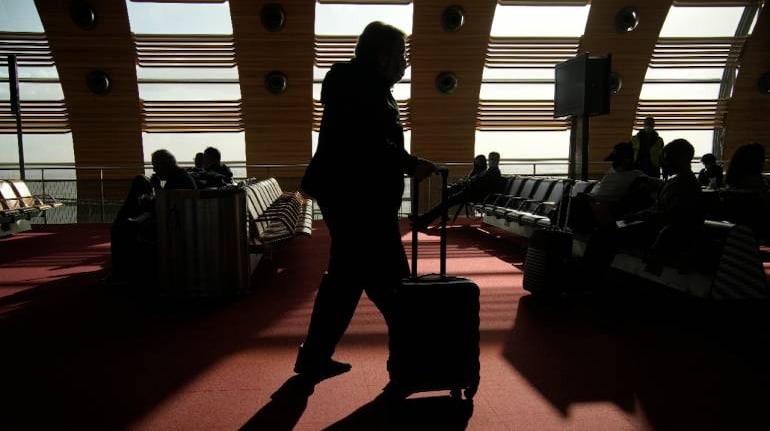



Some domestic airlines have renewed their demand for the removal of price bands for passenger fares, claiming the regulation was delaying a full-fledged recovery in domestic air traffic and stopping them from lowering ticket costs.
The demand comes just days after daily passenger numbers climbed to 360,000 to 380,000, or about 90% of pre-pandemic air traffic.
Civil aviation ministry officials ruled out scrapping the fare bands any time soon given the emergence of the Omicron variant of the COVID-19 virus that has raised concerns of a third wave of the pandemic.
“The current regime of regulated prices is not only hampering the recovery of corporate travel, but is also delaying the unbundling of fares,” a senior executive at a domestic airline said on condition of anonymity.
The Civil Aviation Ministry sets the lower and upper airfare limits for travel within 15 days of booking. The bands do not apply to travel from the 16th day of booking.
The price bands were introduced by the government when airlines were allowed to resume operations after the 2020 COVID-19 lockdown. The move was meant to curb predatory pricing by larger airlines, which smaller rivals are forced to follow at the cost of their financial health to attract passengers.
Unbundling services
The airline executive cited above said that although the Directorate General of Civil Aviation (DGCA) had allowed airlines to unbundle certain services such as preferential seats and meals from the base fare in February, airlines hadn’t been able to do so because of the floor prices set the by the regulator.
“The fare bands are now only limiting the ability of airlines to offer lower fares to customers,” the executive said.
While segments like leisure travel and planned travel are showing signs of recovery, the high fares applicable on flight tickets booked within 15 days were limiting recovery in corporate travel and impromptu weekend travel plans, he added.
Another executive at a domestic airline said the fare caps were hindering the ability of airlines to offer attractive incentives for customers that would encourage them to travel again.
To be sure, not every airline is in favour of the removal of caps. Airlines such as IndiGo, the market leader, and experts have called for the withdrawal of fare regulation. Smaller airlines like SpiceJet favour their continuation until passenger traffic returns to pre-COVID levels.
The Omicron factor
Aviation secretary Pradeep Kharola told Moneycontrol: “Some airlines say we should open up, some airlines say we should be cautious. It’s not that everyone is unanimous on this. That’s where the government comes in.”
Some other government officials said the removal of fare caps was still a while away given the outbreak of the Omicron variant.
“There is a lot of uncertainty around aviation and the Omicron variant at the moment; there may be a need for lockdowns and cut in capacity again if cases start to rise exponentially. So for now there is no discussion around the removal of fare caps,” one senior government official said on condition of anonymity.
He added that if there was no third wave of COVID-19, the government would work proactively with the industry and the DGCA to decide on ending fare regulations.
“Fare bands, they do continue but in the last version, we had made a significant change… The fare bands used to be applicable for 30 days from the booking date, but now we have reduced that to 15 days. Gradually, if you go on decreasing this — from 14 days, 13 days, 12 days — a day would come where fare bands would not be applicable,” he said.
Operating efficiencies
The removal of fare bands is expected to help airlines set prices based on their operating efficiencies; it will also help airlines lower prices on smaller routes where the government-prescribed fare is much higher than pre-pandemic fares.
“Larger routes like Delhi-Mumbai, Mumbai-Bengaluru, Delhi-Kolkata are now reporting pre-pandemic numbers. So the cap in ticket prices is limiting airlines’ ability to increase the prices of tickets. Further, on routes where passenger traffic is low, the floor on ticket prices is pushing first-time passengers away,” another airline executive said.
Experts said the government’s decision to retain the fare bands despite the DGCA allowing unbundling of fares was deterring airlines from improve their operating efficiencies.
“Unbundling fares not only helps customers get the best value for the prices they are willing to pay for air tickets but also help airlines plan out and efficiently use their capacity,” Lokesh Sharma, a senior aviation and defence consultant, said.
“The unbundling of check-in baggage will not only reduce the price of tickets by around 10 percent but will also allow airlines to efficiently plan and use the extra space available in the hangar,” an executive said.
Flawed reasoning?
Some experts also say the government’s reasoning for regulating ticket prices on grounds that it was needed to prevent predatory pricing was no longer valid because the market had recovered to near pre-pandemic levels.
“If there is no third wave of COVID-19, the government should remove regulated ticket prices as soon as possible to help airlines plan out their marketing strategies and further boost recovery,” an expert at Goldman Sachs said.
Domestic flights were allowed to operate from May 25 last year, after a two-month break during the COVID-19 lockdown. Airlines were allowed to operate not more than 33 percent of their pre-COVID domestic services. In October, the government allowed airlines to operate at 100 percent seat capacity.
Discover the latest Business News, Sensex, and Nifty updates. Obtain Personal Finance insights, tax queries, and expert opinions on Moneycontrol or download the Moneycontrol App to stay updated!
Find the best of Al News in one place, specially curated for you every weekend.
Stay on top of the latest tech trends and biggest startup news.